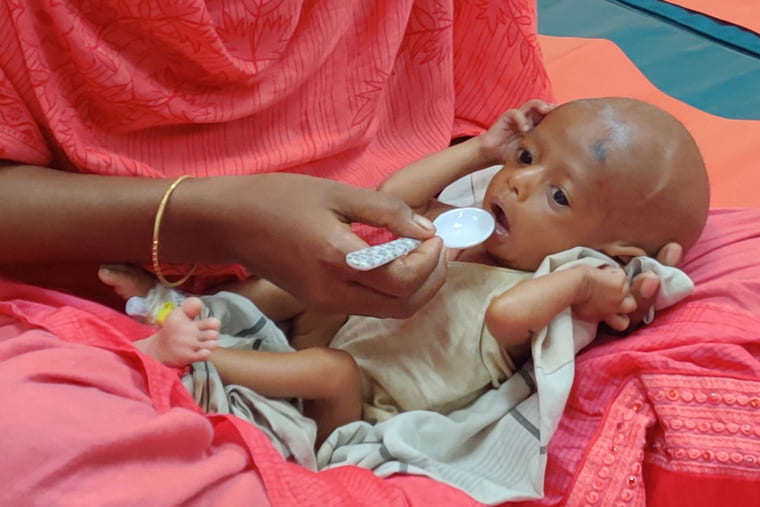About 18 million children under age 5 suffer from severe acute malnutrition, and over 3 million children die from it each year. Treatment with high-calorie supplemental foods and antibiotics can prevent deaths, but these interventions often have limited impact on the long-term effects of severe acute malnutrition, such as persistent stunted growth, disrupted immune function and impaired brain development. Even when treated with standard therapeutic foods, many children continue to have moderate forms of the disease and are at risk of falling back into severe acute malnutrition.
A new study, published April 13 in the journal Science Translational Medicine, from Washington University School of Medicine in St. Louis and the International Centre for Diarrhoeal Disease Research in Dhaka, Bangladesh (icddr,b), shows that a standard milk-based therapy plus treatment with a specific strain of gut bacteria known as Bifidobacterium infantis (B. infantis) for four weeks promotes weight gain in infants with severe acute malnutrition, with accompanying reductions in gut inflammation. The clinical trial was conducted in Dhaka.
The B. infantis strain was chosen for the trial because it has been shown to be safe to give to infants as a probiotic and is known to thrive on specific carbohydrates present in human breast milk. The strain, which had been isolated from the gut microbes of a healthy infant in the U.S., is a commercially available probiotic that meets the Food and Drug Administration’s good manufacturing practice guidelines and was provided by Evolve BioSystems.
Importantly, the investigators found that B. infantis was either undetectable or present in markedly reduced amounts in infants with severe acute malnutrition compared to those with healthy growth.
Although treatment with the U.S. strain of B. infantis produced significant improvements in growth in Bangladeshi infants with severe acute malnutrition, its level of colonization was still tenfold to a hundredfold lower than levels documented in healthy Bangladeshi infants. To identify strains that might colonize to a greater degree and potentially produce superior clinical responses, the research team cultured B. infantis strains from healthy children living in the same community as those with severe acute malnutrition who were enrolled in the clinical trial.
The scientists found one strain that contained genes that allow it to utilize complex carbohydrates present in the local diet more efficiently than the strain investigated in the clinical trial. They went on to study germ-free mice colonized with gut microbial communities — called the microbiota — obtained from an infant with severe acute malnutrition before treatment to show that this Bangladeshi strain was a more efficient colonizer than the U.S. B. infantis strain. These findings set the stage for future clinical studies to test the effects of this newly discovered strain on restoring growth in children with severe acute malnutrition.
“Bacterial strain selection is a critical element in designing future therapies for repairing dysfunctional gut microbial communities that lead to malnutrition,” said co-senior author Jeffrey I. Gordon, MD, the Dr. Robert J. Glaser Distinguished University Professor and director of the Edison Family Center for Genome Sciences and Systems Biology at Washington University School of Medicine. “This pilot study not only shows promising results in treating children with severe acute malnutrition but also underscores how proper development of the gut microbiota is linked to healthy growth of infants.”
The clinical trial was led by co-senior author Tahmeed Ahmed, MBBS, PhD, executive director of the icddr,b, and Sharika Nuzhat, MBBS, a pediatrician in the Nutrition and Clinical Services Division of icddr,b. The trial involved 60 infants ages 2 months to 6 months with severe acute malnutrition, meaning their weight-for-height growth curves were at least three standard deviations below the average for healthy children.
